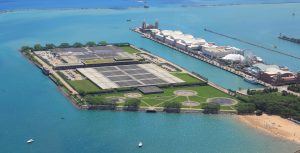DuPage Water Commission signs short contract extension with Chicago for Lake Michigan water
March 17, 2024
Lake Michigan water starts its journey to DuPage County at the James Jardine Water Purification Plant along Chicago’s lakefront.
The DuPage Water Commission will continue to receive Lake Michigan water from the City of Chicago after recently agreeing to a 17-year contract extension.
But the commission may also consider other long-term sources for lake water — including an alternative water system — to serve around 1 million DuPage County residents and an estimated 100,000 new customers coming in Kendall County.
The agreement comes as an initial 40-year contract with Chicago was set to expire this month.
“The shorter contract reflects our intention to explore all options for providing water services to our nearly 1 million residents in the most effective manner possible,” said James Zay, Chairman of the DuPage Water Commission. “We will continue to engage with the City of Chicago to explore ways to enhance our partnership in the interest of our residents, but we have a responsibility to consider all available alternatives.”
According to published reports, the commission could bypass Chicago with a potential north suburban pipeline from Glencoe with links to a northwest suburban water agency. Two other alternative routes could go through Chicago, with one tapping into the lake north of Whiting, Indiana.
The length of the contract extension reflects DWC’s concerns over the maintenance and condition of the Chicago-owned Lexington Pumping Station, the primary station through which all of DuPage County water flows.
The West Side facility needs considerable infrastructure repairs and enhancements, a point the DWC says it has continued to stress to Chicago officials.
“The condition of the Lexington station, and lack of necessary investments to maintain it is concerning,” said Paul May, General Manager of the DuPage Water Commission. “We have a responsibility to provide DuPage County residents with a reliable and quality water source. If the Lexington station fails, it would impact the water supplier for nearly 1 million DuPage County residents.
“Therefore, we continue to advance all options for water supply that make financial and operational sense for DuPage County, including the construction of a new regional suburban water system.”
DWC commissioned various studies and concluded that it is technically feasible and financially viable for the region.
Concurrently with advancing the Alternative Source Water Project, the DWC will remain in contract negotiations with the City of Chicago in an effort to develop a favorable long-term contract.
“Our conversations have not only included the City of Chicago, but we’ve met with other governing bodies to explore all potential opportunities,” Zay said. “We’ve evaluated the financials and timelines of these alternatives and will continue working directly with suburban municipalities and other regional water agencies.”
The DWC was established to solve water quality and quantity problems in DuPage County, resulting in the initial 40-year agreement with the City of Chicago beginning in 1984. The new contract comes as the original agreement neared an end.
In 2022, the City of Chicago agreed to provide Lake Michigan water to Joliet at a rate of roughly $2.50-$3 per 1,000 gallons and plans to build a direct pipeline funded by Joliet. In contrast, DuPage County will pay the City of Chicago $122 million this year to pump water to residents, paying $4.54 per 1,000 gallons.
Currently, DuPage County receives Lake Michigan water through the Lexington Pumping Station. From there, water is conveyed to the DuPage Pumping Station which is then redistributed throughout 30 cities and villages including Naperville, Downers Grove and Wheaton.
A new 30-mile pipeline extension would bring Lake Michigan water to Oswego, Montgomery, and Yorkville. Construction is scheduled to be completed by the end of 2027 and serve around 100,000 users.
“The importance of bringing high-quality Lake Michigan water to our communities cannot be
understated,” said Daniel Di Santo, Oswego village administrator in a statement. “Providing our communities with safe drinking water is among our most important responsibilities as municipalities, and this partnership with the DuPage Water Commission provides a sustainable solution.”
DWC has delivered nearly a trillion gallons of fresh Lake Michigan water to its one million customers during 30 years of pumping operations.



